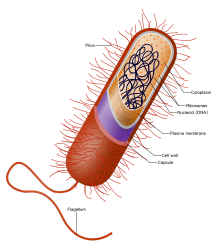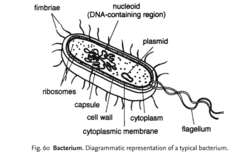
< /bækˈtɪər i əm/.
- ubiquitous one-celled organisms, spherical, spiral, or rod-shaped and appearing singly or in chains, comprising the Schizomycota, a phylum of the kingdom Monera (in some classification systems the plant class Schizomycetes), various species of which are involved in fermentation, putrefaction, infectious diseases, or nitrogen fixation.
noun
- the singular of bacteria
pl n singular -rium (-rɪəm)
- a very large group of microorganisms comprising one of the three domains of living organisms. They are prokaryotic, unicellular, and either free-living in soil or water or parasites of plants or animalsSee also prokaryote
c.1848, singular of bacteria (q.v.).
1847, plural of Modern Latin bacterium, from Greek bakterion “small staff,” diminutive of baktron “stick, rod,” from PIE *bak- “staff used for support.” So called because the first ones observed were rod-shaped. Introduced as a scientific word 1838 by German naturalist Christian Gottfried Ehrenberg (1795-1876).
n. pl. bac•te•ri•a (-tîr′ē-ə)
- Any of the unicellular, prokaryotic microorganisms of the class Schizomycetes, which vary in terms of morphology, oxygen and nutritional requirements, and motility, and may be free-living, saprophytic, or pathogenic, the latter causing disease in plants or animals.
n.
- Plural ofbacterium
Plural bacteria
- Any of a large group of one-celled organisms that lack a cell nucleus, reproduce by fission or by forming spores, and in some cases cause disease. They are the most abundant lifeforms on Earth, and are found in all living things and in all of the Earth’s environments. Bacteria usually live off other organisms. Bacteria make up most of the kingdom of prokaryotes (Monera or Prokaryota), with one group (the archaea) sometimes classified as a separate kingdom. See also archaeon prokaryote.
- Plural of bacterium.
sing. bacterium
Microorganisms made up of a single cell that has no distinct nucleus. Bacteria reproduce by fission or by forming spores.
 Liberal Dictionary English Dictionary
Liberal Dictionary English Dictionary


